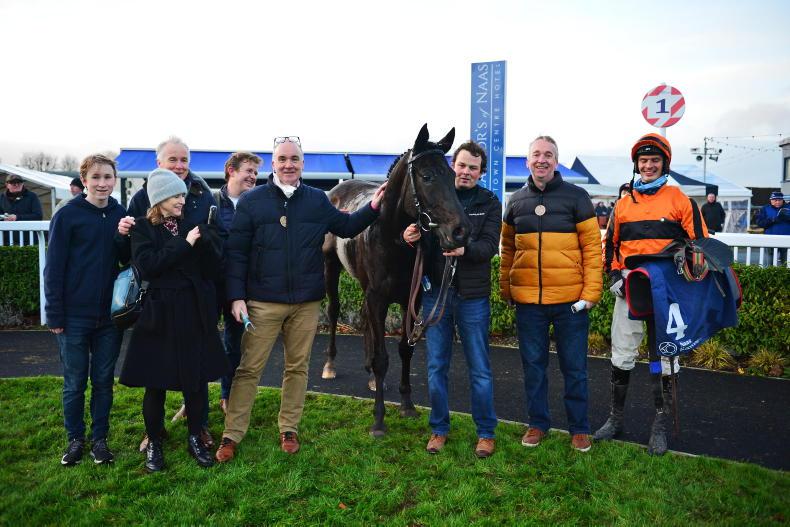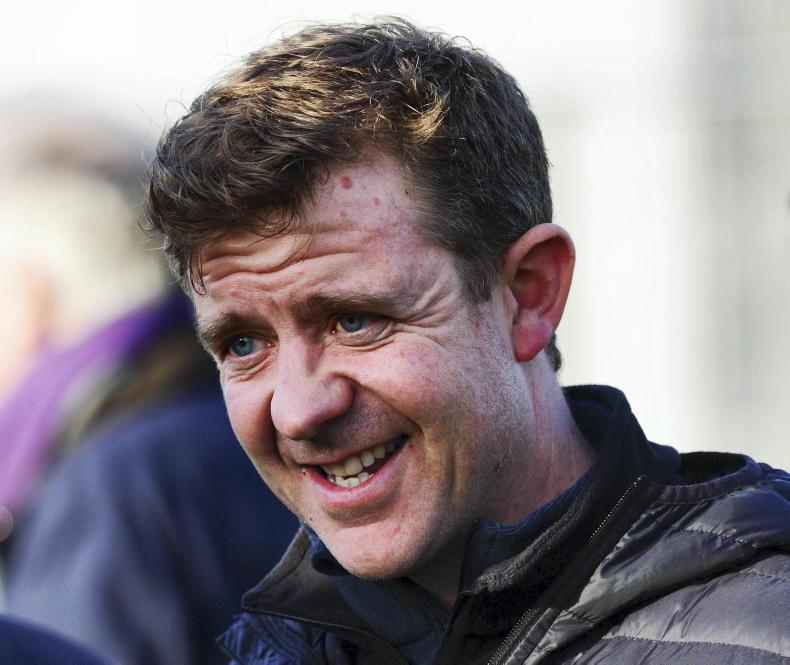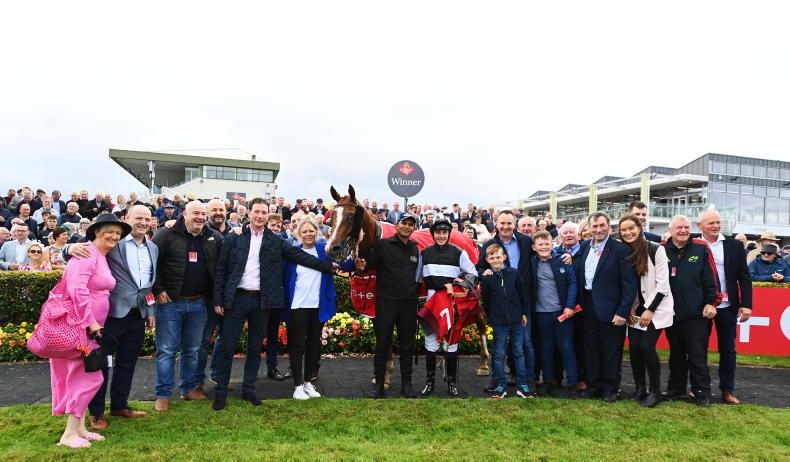How did you get ownership?
I grew up in Listowel, so some interest in racing was not a surprise. In Listowel there are only two seasons, ‘before the races’ and ‘after the races’. All normal activity ceases for the week long racing festival meeting in September.
Like many others I worked in ‘The Island’ during race week as a teenager, selling racecards, in the bars and later on the turnstiles. I always dreamed of being involved with a winner in Listowel some day - I’m still waiting, by the way.
I have been in one syndicate or another most of the time since 1995. There have been plenty of horses who were not good enough to win, but I suppose I have been relatively lucky, being involved with four winning horses so far - one with Willie Mullins, one with Liam Burke, and more recently two winners with Richard O’ Brien.
What was your best day at the races?
I met my wife Noelle at Galway Races in 1991, so come racing and you never know what might happen! I had unbelievable beginner’s luck with my first horse in a syndicate. The horse was Mystical City, trained by the then up-and-coming Willie Mullins, and she won seven races for us, the highlight being the Galway Hurdle in 1996.
Winning a race like the Galway Hurdle is about as good as it gets. Many of my friends and family were there on the day and I still remember the race and the chaotic excitement during and after the race like it was yesterday.
I didn’t think it was possible to top the Galway win, but the recent win with Impulsive Dancer was certainly up there - the way he won made it so memorable. We thought he might win based on what he had been showing at home, but the way he effortlessly cruised up that steep hill in Naas to win so impressively really took the breath away. We had waited more than two years for him to make his debut so it made it all the sweeter.
The biggest drawback about being an owner?
There are lots of drawbacks. It’s expensive, you should probably be prepared for spending up to €20,000 to keep a horse for a year in training fees and other costs. It will be less if the horse is out of training for some of the time. At times you need to be very, very patient, horses take time to get fit and ready to run. Even when fit and well you may have to wait for the right ground conditions or the right race.
Many horses don’t even make it to the track never mind win a race. Horses get injured. You may end up with a moderate horse that even if you are lucky enough to win a race it still doesn’t cover your expenses for the year.
Covid has not helped over the last two years. I think it’s essential to be aware of the drawbacks before you get involved. Despite all the many drawbacks, if you do hit it lucky, the rose-tinted glasses go on immediately and somehow you forget about the drawbacks and there is no feeling like it.
Which racecourse in Ireland treats owners the best?
Leopardstown. There’s a friendly feeling about the place. They look after you well and they aren’t stingy about extra guests, etc., and the viewing of the track is exceptional.
What do you look for in a trainer?
Honesty and someone you can trust is number one for me, you really have to have complete trust in your trainer and it works both ways. As an owner you have to keep up your side of the bargain and pay your bill promptly every month.
Good communication is number two. Most owners like and appreciate regular updates on their horse, even when there isn’t anything major to report. In a smaller yard you can probably get that bit more up close to things and see all the hard work that goes in behind the scenes, so shout out to Colm, James, Georgina and Nikita for looking after Impulsive Dancer so well.
How do you think the current crisis will impact on racing in general?
With rising costs it could be a difficult time for smaller trainers a lot of whom live on a knife edge financially already. Training fees have gone up 20% from January 1st but that had to be done to cover costs. Whether that will put off new owners remains to be seen. And there is an ongoing difficulty in recruiting staff to the sector.
What can be done to encourage owners to keep horses in training?
Encourage and facilitate syndicates. The individual wealthy owners are of course important and racing could not survive without them, but when a syndicate horse is running you have a huge multiplier effect: you have 10 or more families, 10 groups of friends, 10 lots of work colleagues talking about the horse, sending out the WhatsApp messages, planning their trip to the races, having their bet, and having the post-mortem or celebration after the race.
Australia has a big focus of encouraging syndicates to get involved in owning horses. They have recently announced a A$1 million race in 2023 for three-year-olds that will be restricted to syndicate-owned horses (p 36). The statistics you see quoted say that approximately one in 244 adults in Australia own a share in a racehorse. They have really tried to spread the net and make ownership accessible and affordable for a large number of people.
In Ireland the statistics for 2020 show 3,250 registered sole owners, 669 syndicate ownerships and 53 clubs registered for ownership.
That seems like a healthy enough figure for syndicates, but I think it can be expanded. I suspect the majority of syndicates are on the National Hunt side.
Having races at Royal Ascot or Listowel (shameless plug) or Cheltenham or Galway or Leopardstown at Christmas restricted to bone fide syndicate-owned horses could further increase the appeal of being in a syndicate and could encourage more people to get involved. Very few people can afford €20,000 a year plus the purchase price to own a horse on their own, but a much bigger number could aspire to a 2% share or a 5% share or a 10% share.
Trainers probably need to help a bit more with helping new syndicates to get up and running. I also wish more breeders would make some nicely bred fillies available to syndicates to lease. This can give a syndicate (especially on the flat racing front) another potential route into racing at a lower up-front cost. Maybe we haven’t been looking in the right places but we haven’t been able to find many breeders willing to lease fillies over the years.
Buying a horse, what do you look for?
Since 1995 I have been involved in syndicates with family, friends and work colleagues and would have gone to the sales to buy. Now we leave it to the expert Richard (O’Brien) and it works well. He knows what he is talking about and how to put a value on a horse.
What’s next on the agenda?
Impulsive Dancer has been sold since the Naas win. He was bought for Simon Munir and Isaac Souede and has joined Willie Mullins. The calls started to come in right after the race at Naas and over the next few days with different offers. Before Naas we knew we had a chance of winning but had no idea about the opposition.
This was a very difficult decision for us, and we had plenty of discussion on it. It wasn’t unanimous but we were all happy in the end with the decision. Inevitably there are mixed emotions with something like this - you dream of finding a good one, and then when we find one we end up selling him. But economic reality had to come into it, and we will move on to trying to find another one. It was a lovely ‘problem’ to have, and I don’t think any owner minds having that type of decision to make.
We will all follow Impulsive Dancer in his new home and genuinely wish his new connections nothing but success with him. If they decide to try and see if he is the first four-year-old since Cue Card in 2010 to win the Cheltenham Bumper, no one will be cheering louder than us if he skips up the Cheltenham hill as well as he skipped up the hill in Naas on January 2nd.
Covid permitting, if he does run in Cheltenham we may even try to get there to cheer him on in person.
What do you do with your racehorses when their racing days are over?
Richard takes care of them or his assistant Colm Ryan.
What advice would you give to someone thinking of becoming an owner?
Find a trainer you can trust and let him or her do the buying for you. If you don’t know what you are doing, people will see you coming a mile away and may take advantage and yes, I am speaking from experience and learning the hard way!
Plan on the basis that you won’t win any races, and if you do it’s a real bonus. Give your chosen trainer a ring – most trainers’ contact details are easy to find online or through social media and discuss your budget and so on. Get everyone to sign up to a direct debit. Having a bigger budget to buy at the sales is no guarantee of success but in general buying a horse for €50,000 should increase your chances of success compared to buying one for €500. We tend to have a relatively small budget but we have been lucky in having someone like Richard doing the near impossible for us with cheap purchases.
It can be done, so gather up a few like-minded racing fans and start dreaming.




 This is a subscriber-only article
This is a subscriber-only article
 It looks like you're browsing in private mode
It looks like you're browsing in private mode









SHARING OPTIONS: